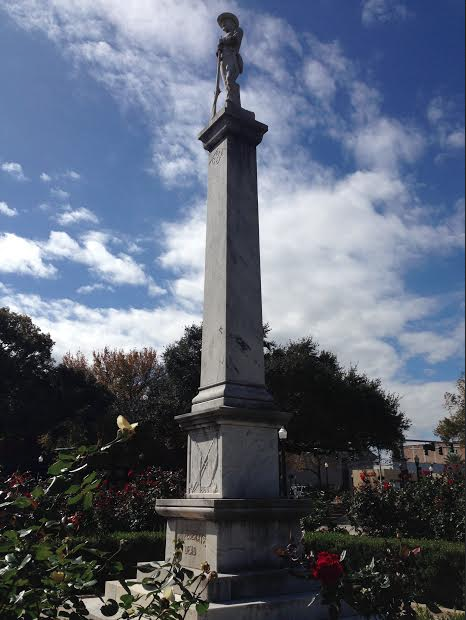History is a lie. Or, rather, a complex galaxy of truths, half-truths, exaggerations, and downplayings that together form a narrative. We don’t write histories because we want to record what really happened; we write them in order to provide ourselves with a meaningful story. We write history because we, as humans, have a fundamental need for meaning in life. We yearn to make order out of chaos, we feel we have to derive positive significance from the hardship and the trials of the everyday. In this sense, history, far from being an accurate record of reality, is an escape from reality. We write our stories so that we can be better people.
The acceptance of these stories, however factually flawed, forms a sort of social contract. We tell ourselves and each other that perhaps our motivations were more noble than they really were at the time. We tell ourselves that what we did, we did because a greater good necessitated it. We tell each other that it’ll all be okay in the end because we lived in pursuit of a noble cause. What action arises from these untruths is, we trust, better than what could have been were we to view ourselves with the coldly rational light of pure record.
In this sense, history is aspirational. As peoples, we want to be more than our ancestors were. We want to imagine that our motivations are superior to theirs, that our dreams and desires make for a better world than theirs did. In the end, we want to be able to say that we’re better people. And it’s for this reason that we play up perceived goods and disregard or explain away the wrongs. It’s not because we don’t know the truth; it’s because locking our eyes on the truth is too painful an experience to bear without going mad. History-writing is a means to cope with the trauma of life without slipping into depression, without collapsing under the weight of the way we really are as human beings- selfish, greedy, self- and other-harming.
History, then, is not a science, but an art. And it is an art that can heal. One might say that history is the ultimate form of therapy because not only does it place a bandage over the wounds of the past, but it positively directs new growth. To say against all plain fact that we are superior to our forebears creates the possibility to truly surpassing them. In striving for nobility, we create the possibility of true nobility.
The erection of monuments is a form of history-writing. The figures we memorialise, the texts we select, are not chosen because they held real significance, though often they did. They are chosen because we wish to see ourselves bettered by their example. Monuments are not primarily about the event being commemorated; they’re about the ones doing the commemorating. And what they say about the past is far less weighty than what they say about the future.
There has been much ink spilled recently over the remaining Confederate memorials standing on public land across the United States. The question has been asked — rightly — for whom does the government, which pays for the upkeep of these memorials, stand. The obvious answer is that it stands for everyone. But this is more complex than saying that is stands for white and black. To say that the government stands for all is to say that the government stands for a social narrative.
In saying that these monuments should be altered or removed, what is really being said is that confidence has been lost in the collective narrative of a people. No one would suggest that those who originally erected these monuments really believed that the cause of the South in the Civil War was wholly just, at least not for the reasons given in many an inscription. What those who built them were doing was writing a therapeutic history. They were dealing with the grief of loss, both personal and social. They were seeking to redeem the past, to place a bandage over the gaping wound of war and hundreds of thousands of sons lying dead on battlefields across the country. They were hoping for a better world in the full knowledge that it was selfishness and denial of the humanity of others that had led to such pointless slaughter.
It could be said that to preserve at public expense a narrative that is untrue is harmful. But is it harmful to preserve symbols of aspiration to a better world? Is there not something still to be learned from the way in which our fathers and mothers dealt with their grief, their anger, their confusion? When we walk past that soldier standing stalwart on a pillar, may we not see their hope?
Every day we tell each other lies. “How are you?” “I’m fine, thanks.” This is a form of social contract, a narrative that says we care about our collective wellbeing. If one were to pry, one might find a great deal of pain, loss, excitement, joy, anger. But we know that to do so, to seek the bare fact at all cost, would to be to cause harm, to offend, to damage the complex fabric that is our everyday life. History is simply this same impulse writ large. Our memorials are one way in which we say to each other, “I’m fine, thanks.” To insist on the cold, hard fact of the matter is to take away the only defense we have as human beings, the ability to tell a story about ourselves, a story that may be riddled with exaggerations and falsehoods, but a story that, hopefully, helps us to be better people.






3 comments
JimWilton
Monuments aren’t history. History is meant to be read and understood in the present. Monuments, by contrast are speech — they are communication with the future. We can take the most famous of war memorials as an example. When Spartans left an epitaph for Leonidas and his warriors at the site of the Battle of Thermopylae, the intent was not to convey objective history — it was an expression of emotion, of loss and of love — an expression that has carried, powerfully for 3,000 years, the message of what it meant to be Spartan. We don’t need to identify with the speaker to understand the message. Memorials aren’t lies. They are subjective expressions from the past. We don’t need to tear them down. But we may need to create new memorials to convey who we are to future generations. Perhaps new memorials to the thousands of victims of lynchings and violence across the South would be a step toward conveying who we are today to our audience in the future.
JimWilton
The reason we study history is to understand the present. But history is not made up of lies and half-truths. It is possible to immerse oneself so deeply in the thought and actions of a period in the past that the past is understood and the present is illuminated. This is a search for truth.
The reasons why monuments are erected is another matter.
Comments are closed.